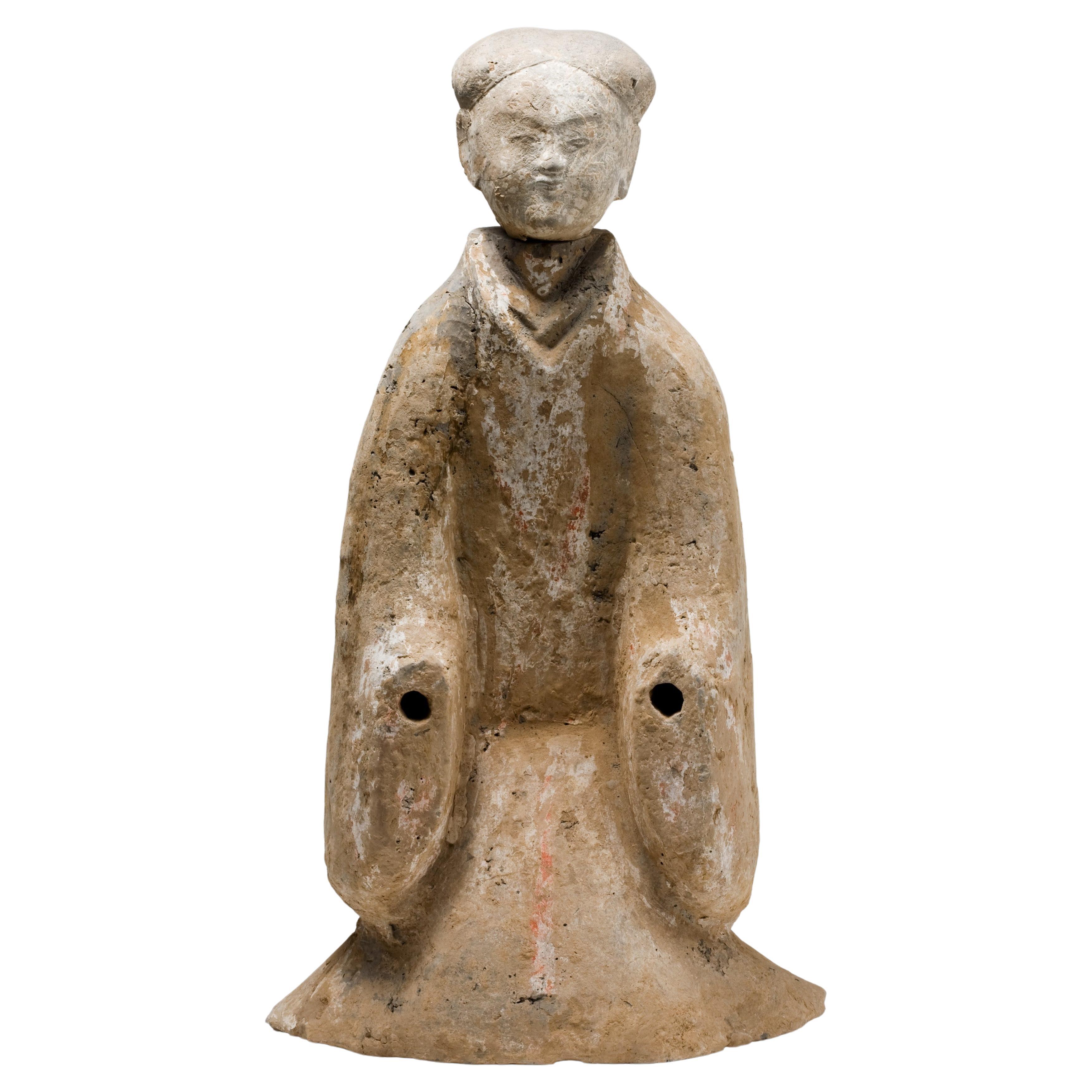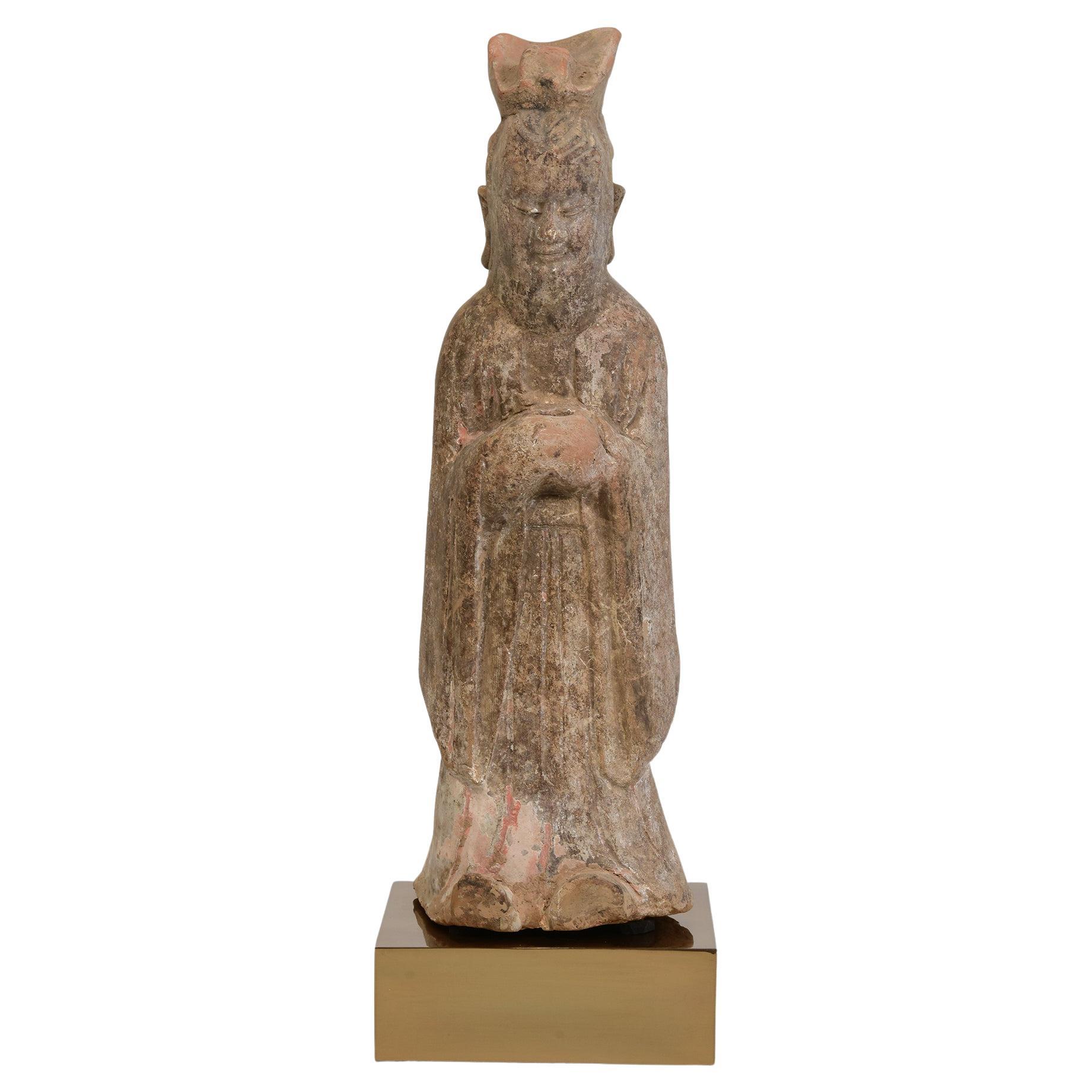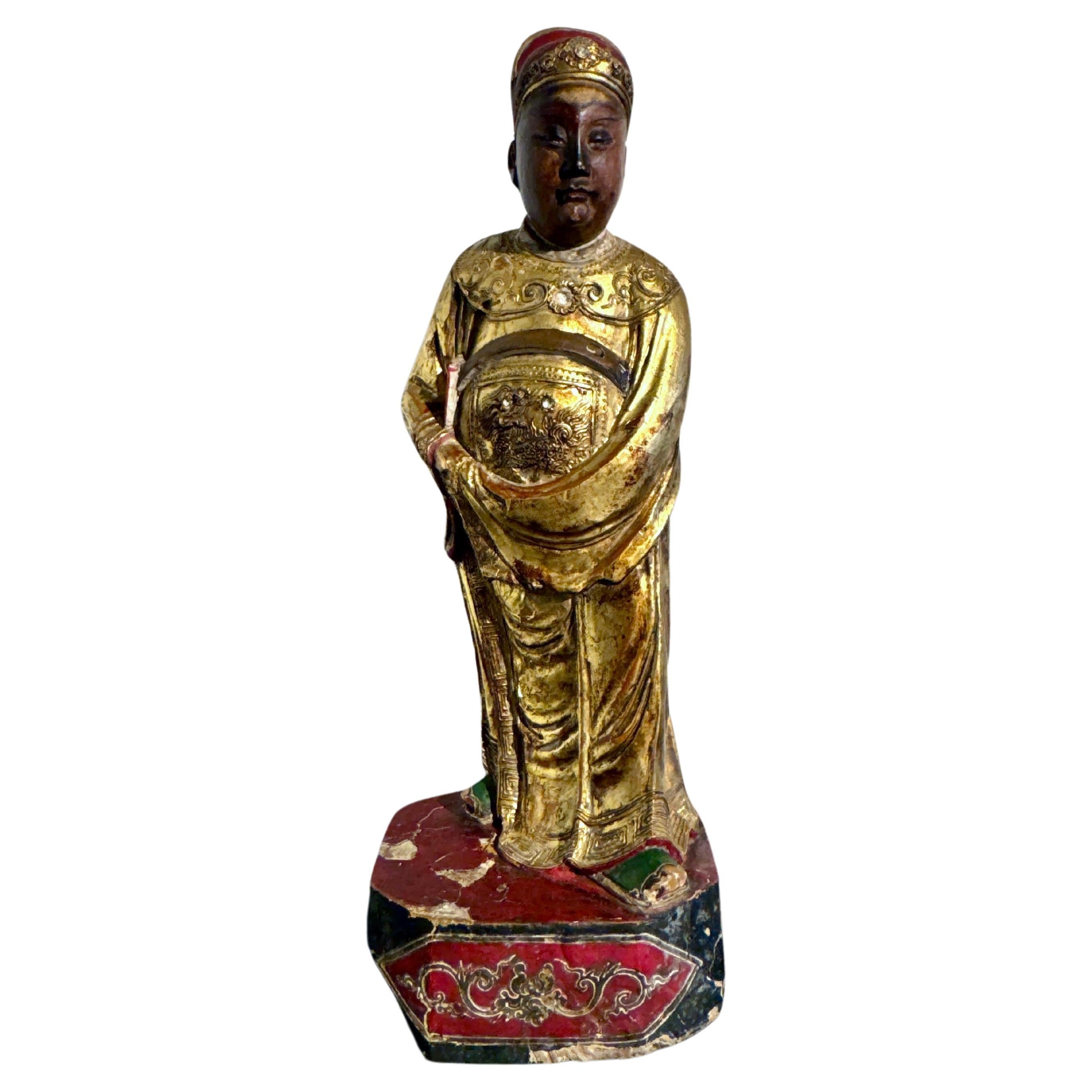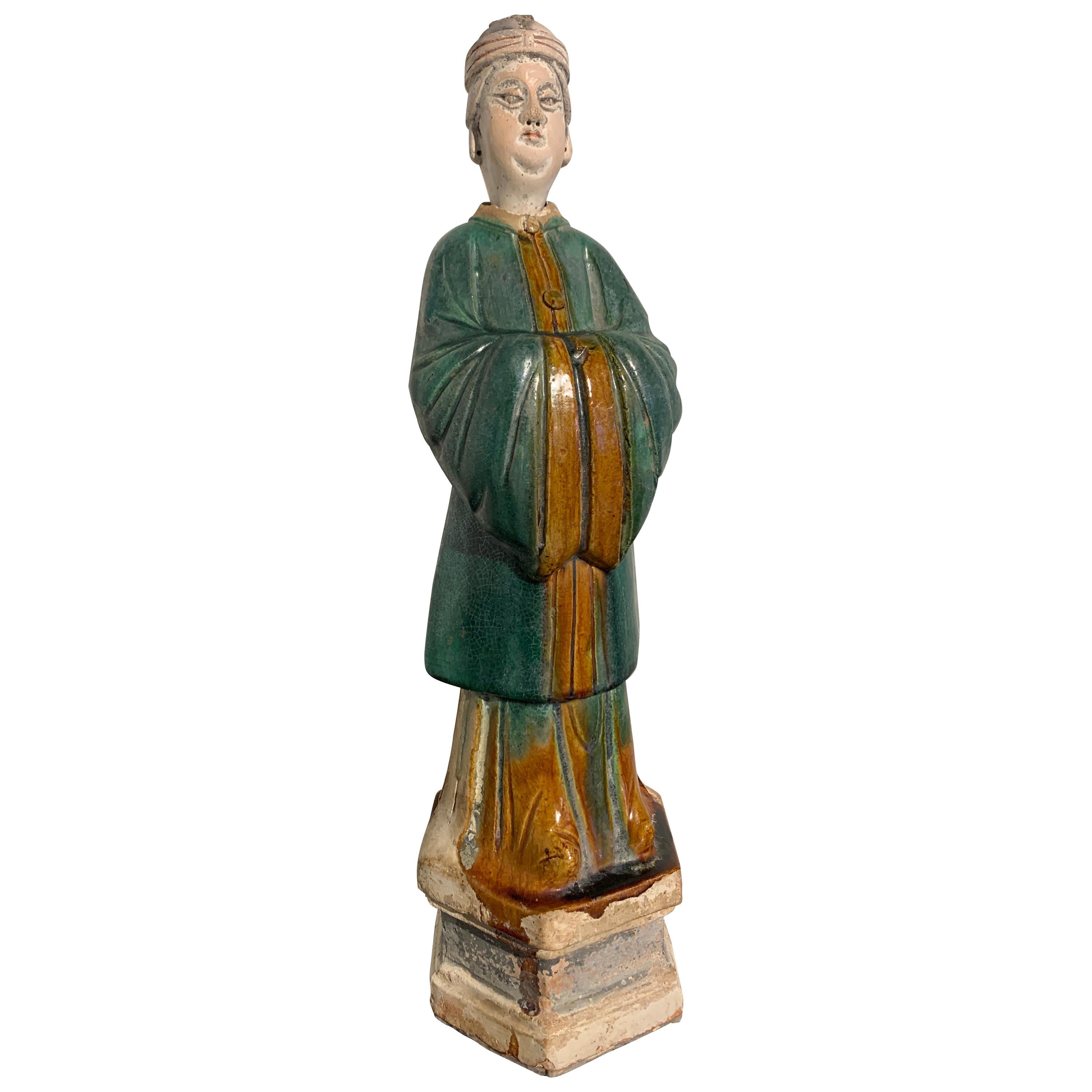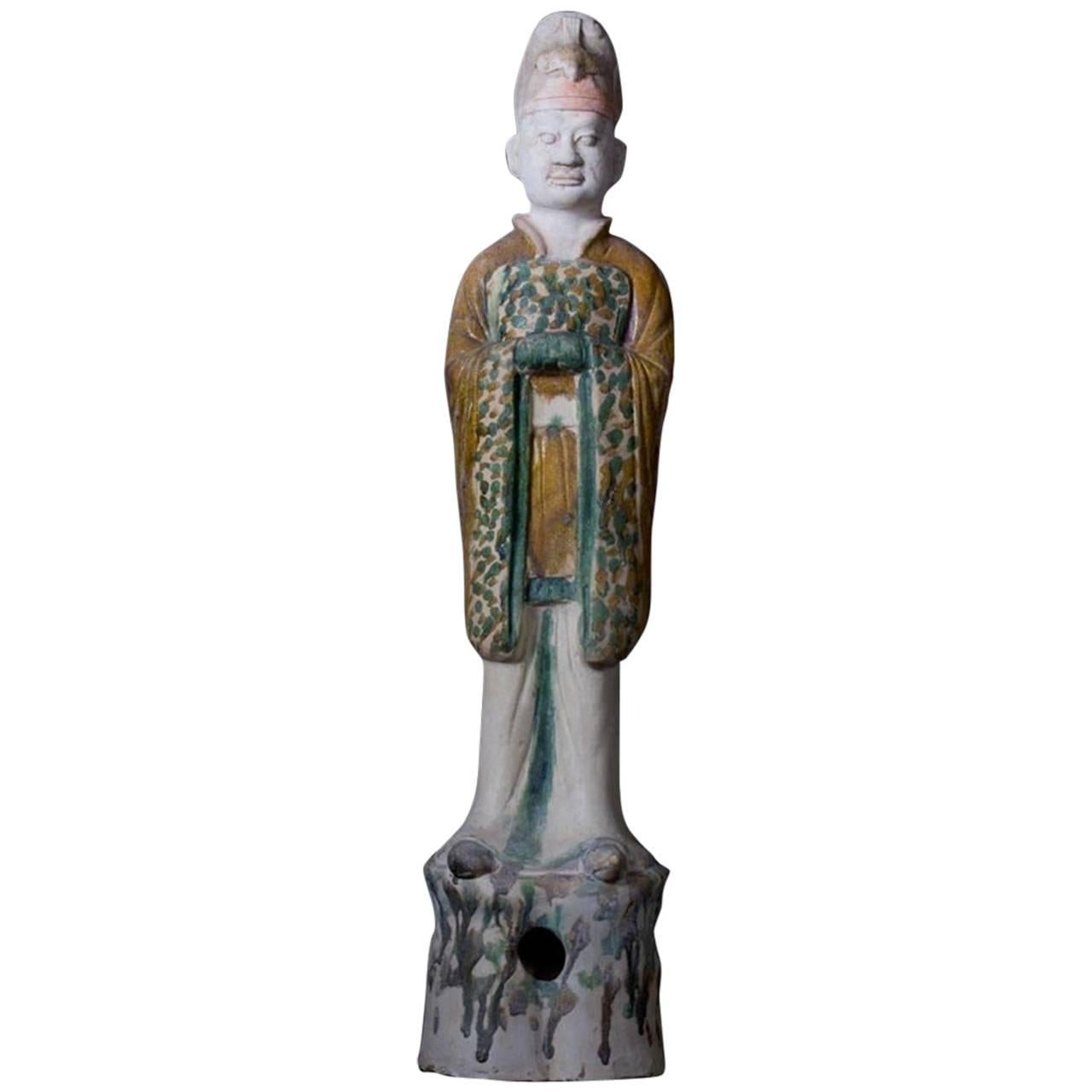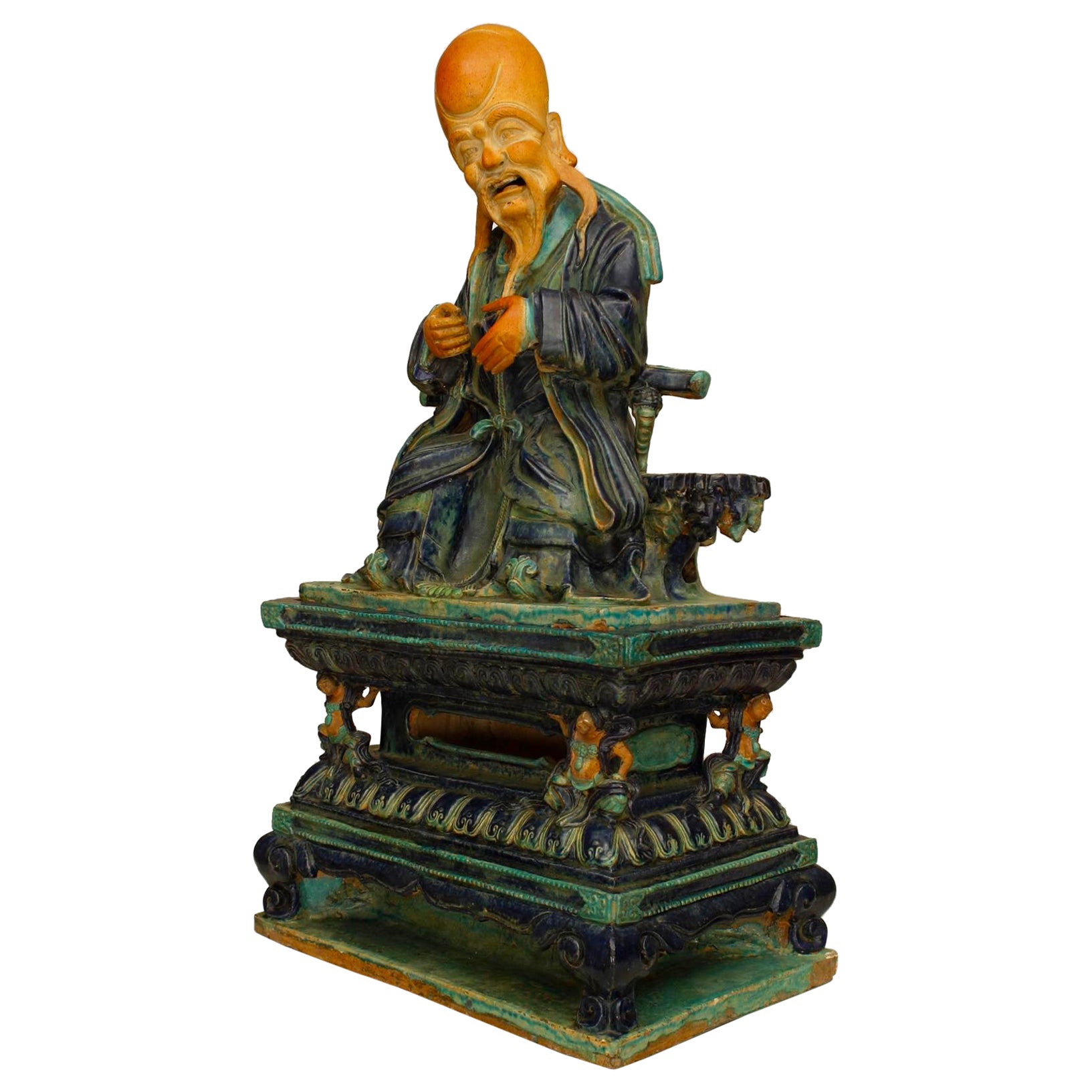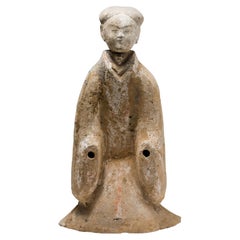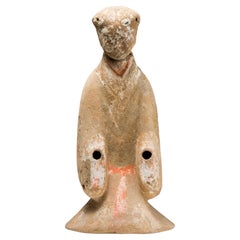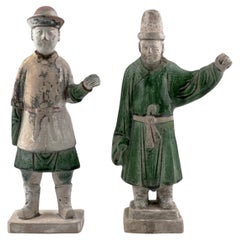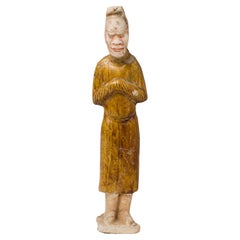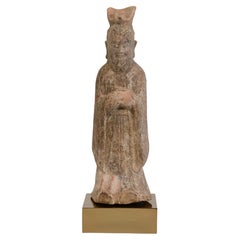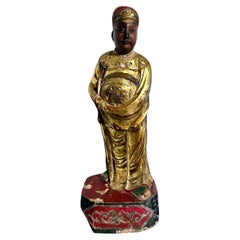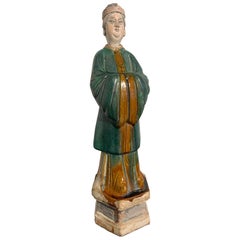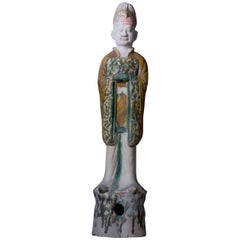Items Similar to Rare Figure of an Attendant Wearing Swirling Vest, Ming Dynasty(1368-1644)
Want more images or videos?
Request additional images or videos from the seller
1 of 14
Rare Figure of an Attendant Wearing Swirling Vest, Ming Dynasty(1368-1644)
$1,995
$3,99050% Off
£1,513.76
£3,027.5250% Off
€1,730.85
€3,461.7050% Off
CA$2,786.47
CA$5,572.9550% Off
A$3,098.18
A$6,196.3650% Off
CHF 1,617.70
CHF 3,235.4050% Off
MX$37,712.39
MX$75,424.7950% Off
NOK 20,641.13
NOK 41,282.2650% Off
SEK 19,339.75
SEK 38,679.5150% Off
DKK 12,917.65
DKK 25,835.2950% Off
Shipping
Retrieving quote...The 1stDibs Promise:
Authenticity Guarantee,
Money-Back Guarantee,
24-Hour Cancellation
About the Item
Statues of attendant crafted from terracotta, dressed in a black coat-like garment with a vest adorned with swirling patterns. Set on rectangular bases.
Period: Ming Dynasty
Medium: Glazed Pottery
Type: Figure
Size : 12cm(Diameter) x 27cm(Height)
Condition : Excellent(It has soil on it, which is presumed to be evidence of excavation)
Provenance : Acquired in late 1990s from Hongkong
Reference :
1) Indianapolis Museum of Art - Dinastia ming, figure maschili, 1368-1644
(Type : Closely related)
2) V&A Museum - Accession number FE.295:1, 2-2005
(Type : Closely related)
3) Sotheby's 01 May 2007 - The Collection Of Paul Otto Taubert & Jewellery And Decorative Arts - Lot 233
(Price range : 5,000 - 7,000 AUD / Type : Closely related)
4) Asian Art Museum, San Francisco - Object number B60P1631 - Standing Man Tomb Figure
(Type : Highly related)
* Ming Dynasty Glazed Pottery Figures
Ming Dynasty glazed pottery figures are renowned for their bold color palette, intricate detailing, and lifelike forms, distinguishing them from earlier traditions. These figures, which depict officials, warriors, animals, and mythical creatures, are characterized by high-gloss lead-based glazes in green, amber, ochre, and sancai (three-color) combinations. The thickly applied glaze pools in recesses, creating depth and enhancing sculptural details. With dynamic postures, expressive facial features, and meticulously rendered drapery, these figures reflect the period’s advancement in ceramic craftsmanship, offering a greater sense of movement and realism compared to the rigid and stylized forms of earlier dynasties.
A defining characteristic of Ming glazed pottery is its elaborate surface detailing, often achieved through raised relief elements and contrasting glazes. Equestrian figures, for example, feature carefully sculpted saddles, harnesses, and decorative embellishments, while human figures are adorned with intricate robes and headdresses. The large scale of these tomb figures, often more imposing than those from previous periods, underscores the increasing importance of funerary art during the Ming era. Unlike later Qing Dynasty figures, which emphasize overglaze enamel decorations and famille-rose palettes, Ming glazed figures maintain a rich, saturated aesthetic, demonstrating the technical mastery of high-fired ceramics. Their sturdy construction and vibrant finishes ensure a lasting visual impact, making them some of the most remarkable works in Chinese ceramic history.
About the Seller
4.8
Gold Seller
Premium sellers maintaining a 4.3+ rating and 24-hour response times
Established in 1999
1stDibs seller since 2023
38 sales on 1stDibs
Typical response time: <1 hour
- ShippingRetrieving quote...Shipping from: seoul, Korea South
- Return Policy
Authenticity Guarantee
In the unlikely event there’s an issue with an item’s authenticity, contact us within 1 year for a full refund. DetailsMoney-Back Guarantee
If your item is not as described, is damaged in transit, or does not arrive, contact us within 7 days for a full refund. Details24-Hour Cancellation
You have a 24-hour grace period in which to reconsider your purchase, with no questions asked.Vetted Professional Sellers
Our world-class sellers must adhere to strict standards for service and quality, maintaining the integrity of our listings.Price-Match Guarantee
If you find that a seller listed the same item for a lower price elsewhere, we’ll match it.Trusted Global Delivery
Our best-in-class carrier network provides specialized shipping options worldwide, including custom delivery.More From This Seller
View AllLarge Pottery Standing Figure of Attendant, Han dynasty
Located in seoul, KR
This artwork, acquired in Hong Kong during the 1990s, is presumed to have been produced in the same kiln from the Han dynasty, based on the head of the Sotheby's reference piece, which also originated from Hong Kong. Furthermore, given its almost identical shape to the piece from the Artemis Gallery...
Category
Antique 15th Century and Earlier Hong Kong Han Antiquities
Materials
Pottery
$3,213 Sale Price
30% Off
Large Pottery Standing Figure of Attendant, Han dynasty
Located in seoul, KR
The statuette shows traces of the original red, black, and white pigmentation. The figure’s body, head, and hands (which in this case are lost) were all made separately to give her an essence of movement and dynamism. Given its almost identical shape to the piece from the Artemis Gallery...
Category
Antique 15th Century and Earlier Hong Kong Han Antiquities
Materials
Pottery
$2,334 Sale Price
34% Off
Two Figures of Attendants, Ming Period(1368-1644)
Located in seoul, KR
Statues of attendants crafted from terracotta, featuring glazes in green, Set on rectangular bases.
Period: Ming Dynasty
Medium: Glazed Pottery
Type: Figure
Condition : Excellent(It has soil on it, which is presumed to be evidence of excavation)
Provenance : Acquired in late 1990s from Hongkong
Reference :
1) Indianapolis Museum of Art - Dinastia ming, figure maschili, 1368-1644
(Type : Closely related)
2) V&A Museum - Accession number FE.295:1, 2-2005
(Type : Closely related)
3) Sotheby's 01 May 2007 - The Collection Of Paul Otto Taubert & Jewellery And Decorative Arts - Lot 233
(Price range : 5,000 - 7,000 AUD / Type : Closely related)
4) Asian Art Museum, San Francisco - Object number B60P1631 - Standing Man Tomb Figure
* Ming Dynasty Glazed Pottery Figures
Ming Dynasty glazed pottery figures are renowned for their bold color palette, intricate detailing, and lifelike forms, distinguishing them from earlier traditions. These figures, which depict officials, warriors, animals, and mythical creatures, are characterized by high-gloss lead-based glazes in green, amber, ochre, and sancai (three-color) combinations. The thickly applied glaze pools in recesses, creating depth and enhancing sculptural details. With dynamic postures, expressive facial features, and meticulously rendered drapery, these figures reflect the period’s advancement in ceramic craftsmanship, offering a greater sense of movement and realism compared to the rigid and stylized forms of earlier dynasties.
A defining characteristic of Ming glazed pottery is its elaborate surface detailing, often achieved through raised relief elements and contrasting glazes. Equestrian figures, for example, feature carefully sculpted saddles, harnesses, and decorative embellishments, while human figures are adorned with intricate robes and headdresses. The large scale of these tomb figures, often more imposing than those from previous periods, underscores the increasing importance of funerary art during the Ming era. Unlike later Qing Dynasty figures...
Category
Antique 15th Century and Earlier Hong Kong Ming Antiquities
Materials
Pottery
$1,820 Sale Price
35% Off
Amber-Glazed Pottery Figure Of A Foreign Official, Tang-Liao Dynasty(7-12th c)
Located in seoul, KR
The figure stands with arms crossed in front, a pose that is often seen in tomb figurines which were intended to serve the deceased in the afterlife. The long robe and facial feature...
Category
Antique 15th Century and Earlier Hong Kong Tang Antiquities
Materials
Earthenware
$1,885 Sale Price
35% Off
A Large Straw Glazed Pottery Figure of a Solider, Sui to Tang Dynasty
Located in seoul, KR
This well-modeled ceramic figure depicts a Scythian warrior in full armor, likely serving as a standard bearer. The warrior stands upright on a thin rectangular base, with clenched f...
Category
Antique 15th Century and Earlier Hong Kong Tang Antiquities
Materials
Straw
$1,275 Sale Price
25% Off
Amber-Glazed Pottery Figure Of An Official, Tang-Liao Dynasty(7-12th century)
Located in seoul, KR
The figure stands with arms crossed in front, a pose that is often seen in tomb figurines which were intended to serve the deceased in the afterlife. The long robe and facial feature...
Category
Antique 15th Century and Earlier Hong Kong Tang Figurative Sculptures
Materials
Earthenware
$1,875 Sale Price
25% Off
You May Also Like
Northern Qi Dynasty, Antique Chinese Pottery Standing Court Man
Located in Sampantawong, TH
Antique Chinese pottery standing court man.
Age: China, Northern Qi Dynasty, A.D. 550 - 577
Size of figure only: Height 29.8 C.M. / Width 9 C.M.
Height including stand: 33.8 C.M.
Co...
Category
Antique 15th Century and Earlier Chinese Antiquities
Materials
Pottery
$1,480 Sale Price
20% Off
Chinese Taoist Figure of Wenchang, Late Qing Dynasty, c. 1900, China
Located in Austin, TX
A tall and impressive figure of the Taoist deity Wenchang Wang, carved, gessoed, lacquered, gilt and polychromed wood, Late Qing Dynasty, circa 1900, Fujian, China.
Wenchang, the T...
Category
Antique Early 1900s Chinese Qing Sculptures and Carvings
Materials
Wood
Chinese Ming Dynasty Glazed Tall Attendant Figure, 16th-17th Century, China
Located in Austin, TX
A tall Chinese green and amber glazed figure of an attendant, Ming Dynasty, 16th-17th century, China.
The figure stands upon an integral plinth, dressed in long robes...
Category
Antique 17th Century Chinese Ming Sculptures and Carvings
Materials
Pottery
Tang Dynasty Court Official in Sancai Glazed Robes, China '618-907' - TL Tested
Located in San Pedro Garza Garcia, Nuevo Leon
A Tang dynasty sancai (three color) glazed pottery model of a Taoist official, TL tested by Ralf Kotalla - worldwide oldest private laboratory specialized for genuine thermoluminesce...
Category
Antique 15th Century and Earlier Chinese Tang Antiquities
Materials
Terracotta
Ming Dynasty Porcelain Shou Lau Figure
Located in Queens, NY
Asian Chinese (Ming Dynasty-Circa 1500) blue & green porcelain Shou Lau seated figure with oversize head (symbolism of longevity & luck) on a base suppo...
Category
Antique 16th Century Chinese Chinese Export Figurative Sculptures
Materials
Porcelain
Rare Early Korean Buddhist Boy Attendant Figure Dongja Joseon Dyasty
Located in Atlanta, GA
A Korean statue of Dongja made from clay/stucco with wood core and painted with polychrome colors circa 18th century of the Joseon Dynasty. The statue is nicely presented on a custom...
Category
Antique 18th Century Korean Archaistic Sculptures and Carvings
Materials
Clay, Wood, Stucco
